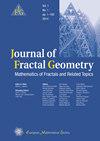Modeling the fractal geometry of Arctic melt ponds using the level sets of random surfaces
IF 1.1
4区 数学
Q1 MATHEMATICS
引用次数: 12
Abstract
During the late spring, most of the Arctic Ocean is covered by sea ice with a layer of snow on top. As the snow and sea ice begin to melt, water collects on the surface to form melt ponds. As melting progresses, sparse, disconnected ponds coalesce to form complex, self-similar structures which are connected over large length scales. The boundaries of the ponds undergo a transition in fractal dimension from 1 to about 2 around a critical length scale of 100 square meters, as found previously from area–perimeter data. Melt pond geometry depends strongly on sea ice and snow topography. Here we construct a rather simple model of melt pond boundaries as the intersection of a horizontal plane, representing the water level, with a random surface representing the topography. We show that an autoregressive class of anisotropic random Fourier surfaces provides topographies that yield the observed fractal dimension transition, with the ponds evolving and growing as the plane rises. The results are compared with a partial differential equation model of melt pond evolution that includes much of the physics of the system. Properties of the shift in fractal dimension, such as its amplitude, phase and rate, are shown to depend on the surface anisotropy and autocorrelation length scales in the models. Melting-driven differences between the two models are highlighted. Mathematics Subject Classification (2010). 51, 35, 42, 86.利用随机曲面的水平集对北极融池的分形几何建模
在晚春时节,北冰洋的大部分地区都被海冰覆盖,上面还覆盖着一层雪。当雪和海冰开始融化时,水在表面聚集形成融化池。随着融化的进行,稀疏的、不相连的冰池聚合成复杂的、自相似的结构,这些结构在大的长度尺度上连接在一起。池塘边界在100平方米的临界长度范围内经历了分形维数从1到2的转变,正如之前从面积周长数据中发现的那样。融池的几何形状在很大程度上取决于海冰和雪的地形。在这里,我们构建了一个相当简单的融池边界模型,作为代表水位的水平面与代表地形的随机表面的交点。我们表明,自回归类各向异性随机傅立叶表面提供了产生观察到的分形维数过渡的地形,随着平面的上升,池塘不断演变和增长。将结果与包含系统大部分物理特性的融池演化的偏微分方程模型进行了比较。分形维位移的幅度、相位和速率等特性取决于模型中的表面各向异性和自相关长度尺度。这两种模型之间由熔化驱动的差异得到了强调。数学学科分类(2010)。51、35、42、86。
本文章由计算机程序翻译,如有差异,请以英文原文为准。
求助全文
约1分钟内获得全文
求助全文

 求助内容:
求助内容: 应助结果提醒方式:
应助结果提醒方式:


